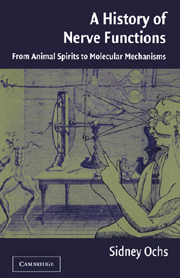Book contents
- Frontmatter
- Contents
- Preface
- 1 Introduction: Greek Science and the Recognition of Nerve as a Channel
- 2 Galen's Physiology of the Nervous System
- 3 Nerve, Brain, and Soul in the Middle Ages
- 4 Renaissance and the New Physiology
- 5 New Physical and Chemical Models of Nerve in the Enlightenment
- 6 New Systematizations of Nerve Function in the Enlightenment
- 7 Electricity as the Agent of Nerve Action
- 8 Nerve Fiber Form and Transformation
- 9 Wallerian Degeneration: Early and Late Phases
- 10 Nerve Regeneration
- 11 Characterization of Axoplasmic Transport
- 12 Molecular Models of Transport
- 13 Actions of Neurotoxins and Neuropathic Changes Related to Transport
- 14 Purposeful Reflexes and Instinctive Behavior
- 15 Neural Events Related to Learning and Memory
- 16 Epilogue: With Observations on the Relation of the Nervous System to Mind
- Bibliography
- Index
14 - Purposeful Reflexes and Instinctive Behavior
Published online by Cambridge University Press: 13 August 2009
- Frontmatter
- Contents
- Preface
- 1 Introduction: Greek Science and the Recognition of Nerve as a Channel
- 2 Galen's Physiology of the Nervous System
- 3 Nerve, Brain, and Soul in the Middle Ages
- 4 Renaissance and the New Physiology
- 5 New Physical and Chemical Models of Nerve in the Enlightenment
- 6 New Systematizations of Nerve Function in the Enlightenment
- 7 Electricity as the Agent of Nerve Action
- 8 Nerve Fiber Form and Transformation
- 9 Wallerian Degeneration: Early and Late Phases
- 10 Nerve Regeneration
- 11 Characterization of Axoplasmic Transport
- 12 Molecular Models of Transport
- 13 Actions of Neurotoxins and Neuropathic Changes Related to Transport
- 14 Purposeful Reflexes and Instinctive Behavior
- 15 Neural Events Related to Learning and Memory
- 16 Epilogue: With Observations on the Relation of the Nervous System to Mind
- Bibliography
- Index
Summary
The ancient view that the spinal cord is a nerve-like prolongation of the brain received experimental support from Galen, who showed that by cutting the cord transversely, sensation from the body below the level of the cut was lost, as was motor power – effects mimicking those seen when cutting a peripheral nerve (Chapter 2). Even as late as the seventeenth century, Descartes looked on the cord as only a conduit for nerve tubules passing sensation to the brain, where reflexes are controlled (Figure 5.5). But, study of the decapitated animal indicated that reflexes remained present in the spinalized animal, with its purposive-like behavior leading to the hypothesis that some mind-like principle was present in the cord. As the anatomy and physiology of the nervous system became better understood, aided in large part by the discovery of the Bell-Magendie law in the early part of the nineteenth century, the question was then asked whether mind-like behavior could be accounted for by the complex interconnectivity of neurons in the spinal cord. This question was also raised with respect to the instinctive behavior seen in lower forms and the emergence of higher functions in the course of evolution. The development of the brain with centers for higher functions of learning and memory; in man ideation; caused the lower centers of the spinal cord to become more machine-like in its reflex behavior.
Information
- Type
- Chapter
- Information
- A History of Nerve FunctionsFrom Animal Spirits to Molecular Mechanisms, pp. 305 - 316Publisher: Cambridge University PressPrint publication year: 2004
